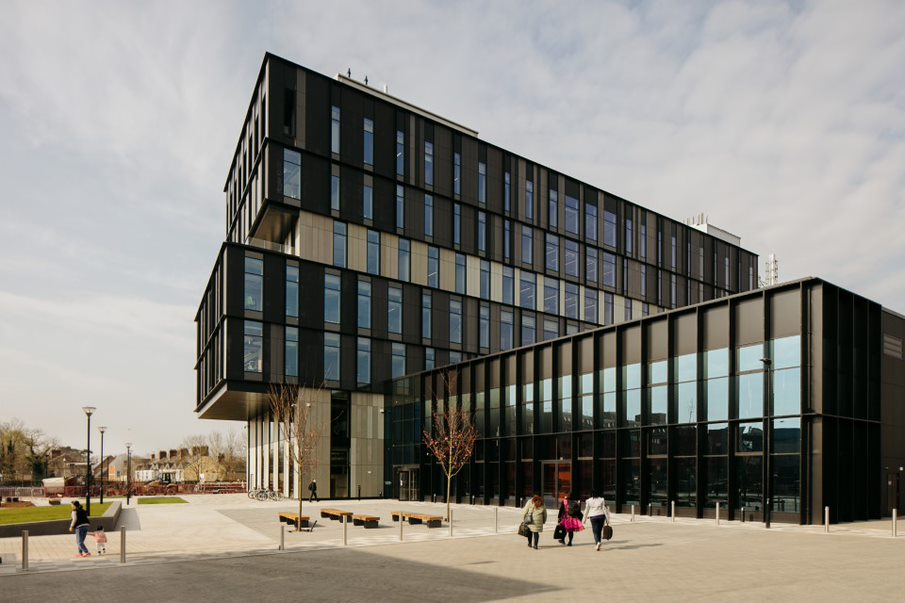Cardiff’s innovation support has recently received a boost from HEFCW innovation funding, which has enabled the university to enhance the ways in which it is reaching out and giving back to SMEs and larger organisations within the locality. Within its suite of innovation support, it provides opportunities for SMEs to come together, network and benefit from the academic expertise within the university.
1. Please provide a brief description of the KE project/ case study and why you believe it is considered good practice or innovative (and for whom). What challenge were you trying to achieve?
Our region has a high concentration of SMEs, so our programme of work includes interventions relevant for specific industries. For example, with the help of Strength in Places (SIP) funding, our Media Cymru project provides research, development and innovation (RD&I) funding to SMEs, micro businesses and freelancers in the media industry.
We established the National Software Academy to help increase the supply of software engineers in the region to meet demand. The local SME and startup community is a major beneficiary of this programme. Key features of our degree programmes at both undergraduate and post graduate level include extensive engagement with industry through client-facing projects and a focus on teamwork and industry working practices. Our Data Science Academy is based on the same model, supplying postgraduate degrees designed to meet the need of industry for highly skilled, work ready graduates.
As part of our HEFCW-funded Research Wales Innovation Fund (RWIF – equivalent to HEIF in England), we ran a seed funding programme supporting over 150 small-scale impact and innovation projects enabling academics to work with external partners, several of which were SMEs. We have also been working hard to broaden the range of academics involved in commercialisation and have developed a comprehensive knowledge exchange development programme to support academics, particularly those whose disciplines might not traditionally consider commercialisation, e.g., arts, humanities, and social sciences, to consider how commercialisation and business development might be appropriate for their research outputs.
-
Where did the idea for the project/ programme come from? Was this related to a strategic objective? How did you secure senior buy in?
At the heart of Cardiff University’s mission is our contribution to the social, cultural and economic development of Wales and the United Kingdom. This involves recognising the need to support collaborative activity with both small and large organisations.
Historically, European Regional Development Funds (ERDF) played a big part in Cardiff’s engagement with SMEs. Now we are working with UK funders as well as regional actors, for example, increasing capacity to deliver KTPs.
One of our tasks has been to understand the nature and sectors of the companies in our locality and match them with academic expertise. Alignment of strategic aims (Research & Innovation with Civic Mission) had helped achieve senior buy in. Externally, developing the local economy through research-based innovation approaches aligns well with the Welsh Government’s Innovation Strategy and Cardiff Capital Region City Deal’s Regional Economic Industrial Plan.
-
What impact/ outcome has this project/ activity had on your university? Students? Local economy? Staff? Other external parties, e.g., businesses.
We were part of the SETsquared Scale Up programme funded through the Connecting Capabilities Fund in England, and HEFCW in Wales. This supplied an opportunity for a range of SMEs to engage in innovation in more ways than they have in the past. It has also helped us to introduce companies to the application of academic research in their context.
The opening of Cardiff Innovations, the university’s business acceleration centre, alongside our life sciences incubator, Medicentre, has helped us connect with the SME community. Our tenants and members are introduced to the opportunities provided by the university through research collaboration to access skills and talent. This is building an ecosystem which in turn should attract more businesses to the region.
-
How did you measure impact?
Our main evaluative frameworks are external assessments such as our HE-BCI survey return, which feeds into HEFCW’s National Measures formula used to calculate RWIF funding. Some of the key metrics that we monitor for this, which help us plan strategy are spinouts, licensing income, collaborative research income etc. Historically, we have also demonstrated how we work well with businesses through our REF impact case studies.
We also commissioned a report from London Economics on the university’s overall contribution to the local UK and Welsh economy. This found that, for the 2020-21 academic year, for every £1M invested in Cardiff University research (excluding activities that have a knowledge exchange element), £4.89M is generated for UK companies. Further, £59M was generated through active spinouts and staff and student start-ups, supporting 1,285 full-time jobs, 665 of which are in Wales. The report provides us with a strong baseline for future analysis of new interventions over the coming years.
-
What types of resources were required to implement this project?
RWIF funding was introduced in Wales in 2020 creating a boost for the university and its ability to dedicate resources into managing and developing activity in this space. Prior to that, we had not received strategic innovation funding since 2014, putting us at a disadvantage to HEIs outside Wales. All activity was funded centrally or through competitive project-based bidding.
RWIF has gone some way to start to bridge this gap and we have been intentionally strategic about investing in staff to support bid writing, business engagement, and commercial research translation, as well as non-commercial impact and public engagement activities. We have also used some of the funding to support our Innovation Institutes to enable them to enhance their R&D through bespoke initiatives that are appropriate to the sectors with whom they collaborate.
-
What are the governance structures in place to oversee it?
The Pro Vice-Chancellor for Research, Enterprise and Innovation has overall responsibility for innovation, commercialisation and business engagement. He chairs a strategy group that covers research, enterprise, and innovation, which provides a mechanism for high-level discussion with senior professional services colleagues leading on the full breadth of our innovation activity plus senior academic deans for R&I who represent our three colleges, as well as our Dean for Research (& Innovation) Culture and Environment. This group feeds up into our University Executive Board, chaired by the Vice-Chancellor, and into other active groups, one of which focuses on knowledge exchange, innovation and external relationships.
-
Describe any challenges that you have had to overcome either before, during or after implementing this project?
One of the challenges for us is the lack of an institutional CRM system so capturing data across the whole university is hard. We have access to data through our costing and pricing system and through localised use of a CRM system and we are exploring possibilities around CRM systems, which would enable us to further enhance our targeted activity with external partners.
There is also a challenge with the variability in how academics approach working with external partners. The knowledge exchange and impact development programme aims to address this through upskilling researchers on engaging with external collaborators to support more productive bi-directional relationships. Another way we are addressing this is the support we provide around KTPs. Working with SMEs can create practical challenges, e.g., around payment systems, so we are working to develop our processes to be more dynamic and flexible, whilst maintaining robust governance.
-
Next steps?
There has been a significant investment by the university in our flagship Innovation Institutes which cover Digital Transformation, Net Zero, Neuroscience and Mental Health, and Security Crime and Intelligence. We will be working with these institutes to help them further develop their relationships with industry and seek out opportunities to develop new clusters in the region building on our successes with the SiP fund with our CSconnected and media.cymru projects.
In January, we welcomed a new Head of Research, Commercialisation and Impact who is developing a new commercialisation strategy, which will include a focus on SMEs.











